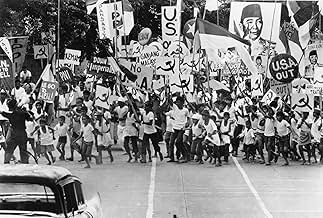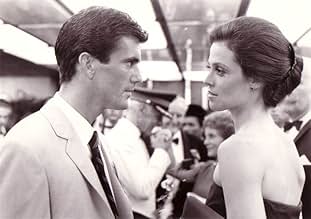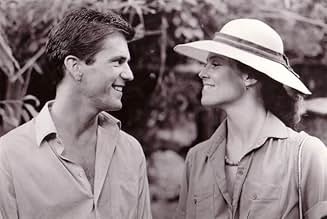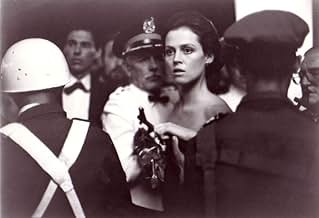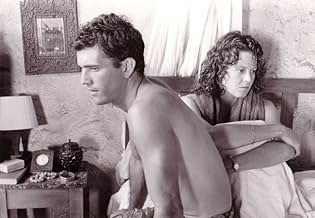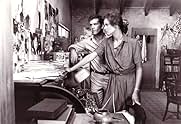IMDb RATING
7.1/10
24K
YOUR RATING
A young Australian reporter tries to navigate the political turmoil of Indonesia during the rule of President Sukarno with the help of a diminutive photographer.A young Australian reporter tries to navigate the political turmoil of Indonesia during the rule of President Sukarno with the help of a diminutive photographer.A young Australian reporter tries to navigate the political turmoil of Indonesia during the rule of President Sukarno with the help of a diminutive photographer.
- Won 1 Oscar
- 10 wins & 14 nominations total
Featured reviews
15 years after its release, I finally get to see what to my knowledge is the only english-speaking film that tells the story of Indonesia circa the 1965 revolution.
A very young Gibson is convincing as the inexperienced but ambitious reported determined to make his mark in telling the story of Sukarno's last moments in power. Equally brilliant is Sigourney Weaver, and yet one feels that this film did not give her the opportunity to show her true calibre.
The one who ultimately steals the show, then, is Linda Hunt, playing the enigmatic and passionate Billy, who understands the true psyche of Indonesia better than any of the other foreign characters in this story.
When Billy solemnly expresses his disappointment to Guy, proclaiming, "I created you", it evoked images of Weir's latest masterpiece, The Truman Show, where Christof has fashioned the persona of Truman Burbank for his TV spectacle. Perhaps a running theme in Peter Weir's work? Must check out...
I marvelled at the authenticity of the setting. It certainly looked like Jakarta. The faces, the atmosphere, the buildings, and yet, those scenes were shot in the Philippines, with mainly Filipino actors! Just goes to show the similarity among Indonesia and the Philippines.
I see now why this film was never made available in Indonesia (to my knowledge). The last few moments of the film show the stark reality of communist executions by Soeharto's new military regime, horrifying pictures of mere pawns being slaughtered... and the parting message from a self-confessed PKI member:"Am I stupid for wanting to change my country's condition?" is one of the best lines in this film.
A very young Gibson is convincing as the inexperienced but ambitious reported determined to make his mark in telling the story of Sukarno's last moments in power. Equally brilliant is Sigourney Weaver, and yet one feels that this film did not give her the opportunity to show her true calibre.
The one who ultimately steals the show, then, is Linda Hunt, playing the enigmatic and passionate Billy, who understands the true psyche of Indonesia better than any of the other foreign characters in this story.
When Billy solemnly expresses his disappointment to Guy, proclaiming, "I created you", it evoked images of Weir's latest masterpiece, The Truman Show, where Christof has fashioned the persona of Truman Burbank for his TV spectacle. Perhaps a running theme in Peter Weir's work? Must check out...
I marvelled at the authenticity of the setting. It certainly looked like Jakarta. The faces, the atmosphere, the buildings, and yet, those scenes were shot in the Philippines, with mainly Filipino actors! Just goes to show the similarity among Indonesia and the Philippines.
I see now why this film was never made available in Indonesia (to my knowledge). The last few moments of the film show the stark reality of communist executions by Soeharto's new military regime, horrifying pictures of mere pawns being slaughtered... and the parting message from a self-confessed PKI member:"Am I stupid for wanting to change my country's condition?" is one of the best lines in this film.
This excellent movie is set in 1965 Indonesia, when an Australian reporter named Gay Hamilton is assigned on his first work as a foreign journalist. His apparently simple mission to Yakarta soon turns hot when he interviews a rebel leader , while President Sukarno was toppling by pressure left from communists and right from military. Guy soon is the hottest reporter with the help of his photographer, a native, half- Chinese midget named Kwan . Eventually Hamilton must confront moral conflicts and the relationship between Billy and him reaches some problems connected with a British diplomatic attaché , at the same time the political upheaval takes place in coup détat.
Mel Gibson is good as correspondent covering a conflict and finding himself becoming personally involved when he befriends a free-lance photographer named Billy Kwan and falling for a beautiful Embassy assistant, a mesmerizing Sigourney Weaver .The movie has its touching moments found primarily in the superb supporting performances as Michael Murphy as lively journalist , Bill Kerr as veteran Colonel and of course diminutive Linda Hunt who steals the show as sensible photographer in her Academy Award-winning character, a woman acting a man, and well deservedly prized. Moving and intimate musical score though composed by synthesizer by Maurice Jarre. Atmospheric cinematography that adequate as a mood-piece by Russell Boyd.
The motion picture is stunningly directed by Australian director Peter Weir who achieved several hits (Witness, Gallipoli, The last wave) and some flop (Mosquito coast, The plumber). The movie belongs to sub-genre that abounded in the 80s about reporters around the world covering dangerous political conflicts , such as Nicaragua in ¨Under fire¨ by Robert Spottswoode with Nick Nolte , Gene Hackman and Joanna Cassidy, Salvador in ¨Salvador¨ by Oliver Stone with James Woods and James Belushi, and Libano in ¨Deadline¨ by Nathaliel Gutman with Christopher Walken and Hywel Bennett. These movies are very much in the vein of ¨The year of living dangerously¨.
Mel Gibson is good as correspondent covering a conflict and finding himself becoming personally involved when he befriends a free-lance photographer named Billy Kwan and falling for a beautiful Embassy assistant, a mesmerizing Sigourney Weaver .The movie has its touching moments found primarily in the superb supporting performances as Michael Murphy as lively journalist , Bill Kerr as veteran Colonel and of course diminutive Linda Hunt who steals the show as sensible photographer in her Academy Award-winning character, a woman acting a man, and well deservedly prized. Moving and intimate musical score though composed by synthesizer by Maurice Jarre. Atmospheric cinematography that adequate as a mood-piece by Russell Boyd.
The motion picture is stunningly directed by Australian director Peter Weir who achieved several hits (Witness, Gallipoli, The last wave) and some flop (Mosquito coast, The plumber). The movie belongs to sub-genre that abounded in the 80s about reporters around the world covering dangerous political conflicts , such as Nicaragua in ¨Under fire¨ by Robert Spottswoode with Nick Nolte , Gene Hackman and Joanna Cassidy, Salvador in ¨Salvador¨ by Oliver Stone with James Woods and James Belushi, and Libano in ¨Deadline¨ by Nathaliel Gutman with Christopher Walken and Hywel Bennett. These movies are very much in the vein of ¨The year of living dangerously¨.
One of the most perfect movies ever made. A true slice of life - what art is supposed to be all about. The music is extraordinary - note how Jarre uses it (and I will say no more for fear of spoiling the effect). No, this wasn't filmed on location, but I don't think that should matter, as the ability of the film to evoke a place and a period is remarkable. I first saw this movie by chance; I have owned it ever since. It's one of these rare movies that are made as an artist is climbing upwards in career but not yet devoured by the commercial interests who will notice and try to effect a lucrative transformation.
Peter Weir's movie, set in Sukarno's Indonesia in 1965, can be seen as four films in one. The first is socio-political, focusing on the plight of the impoverished Indonesian people, the impending insurrection by the communist movement, and the bloody, chaotic aftermath of the coup. The second, coloured in Graham Greene-ish tones, has a cast of western journalists and diplomats failing to make sense of what's happening around them, and falling back on sex, drink and cynicism. The third - and most important in commercial-cinema terms - is a convincingly acted romance between rookie foreign correspondent Guy Hamilton (Mel Gibson) and British diplomat Jill Bryant (Sigourney Weaver), culminating in an unlikely and sentimental ending to the film.
But it is the fourth of these "sub-movies" which is the most intriguing; this concerns the diminutive and enigmatic Australian/Chinese photographer Billy Kwan, an astonishing - and Oscar winning - portrayal by actress Linda Hunt. Billy sees himself as a puppet-master, pulling the strings of friends and colleagues, particularly of Jill and Guy, whom he throws together. But his need to take control also motivates him to help local people, not through indirect and political means, but directly like an early Christian, and this apparently benign course leads to tragedy. Billy is the true heart and conscience of this film.
Weir is not entirely successful in weaving these strands together, and leaves a few gaps in both plot and characterisation. He is also occasionally guilty of melodrama (a fault which, in the movie, Jill warns Guy about), especially in the film's closing scenes - though certainly not where he shows communist sympathisers being shot, which is factual. On the whole, however, the movie works on both commercial and artistic levels, and should be seen.
But it is the fourth of these "sub-movies" which is the most intriguing; this concerns the diminutive and enigmatic Australian/Chinese photographer Billy Kwan, an astonishing - and Oscar winning - portrayal by actress Linda Hunt. Billy sees himself as a puppet-master, pulling the strings of friends and colleagues, particularly of Jill and Guy, whom he throws together. But his need to take control also motivates him to help local people, not through indirect and political means, but directly like an early Christian, and this apparently benign course leads to tragedy. Billy is the true heart and conscience of this film.
Weir is not entirely successful in weaving these strands together, and leaves a few gaps in both plot and characterisation. He is also occasionally guilty of melodrama (a fault which, in the movie, Jill warns Guy about), especially in the film's closing scenes - though certainly not where he shows communist sympathisers being shot, which is factual. On the whole, however, the movie works on both commercial and artistic levels, and should be seen.
It's 1965 Jakarta in Indonesia under the brutal rule of President Sukarno. Guy Hamilton (Mel Gibson) is on his first foreign assignment for the Australian Broadcasting Service. He is befriended by photographer half-Chinese dwarf Billy Kwan (Linda Hunt). There is an air of anti-western feeling. Guy is lost without connections until Billy starts helping him out. He has an affair with British diplomat Jill Bryant (Sigourney Weaver). It's a world of murky Cold War politics, secrets and trying morality.
This has a great exotic atmosphere. The movie has a sense of impending doom. Mel Gibson is terrific and shows his superior star power. Linda Hunt creates such a compelling character. It does need to heighten the tension a little. The plot meanders in this murky world. It needs a direction. Nevertheless I just love the dark exotic mood.
This has a great exotic atmosphere. The movie has a sense of impending doom. Mel Gibson is terrific and shows his superior star power. Linda Hunt creates such a compelling character. It does need to heighten the tension a little. The plot meanders in this murky world. It needs a direction. Nevertheless I just love the dark exotic mood.
Did you know
- TriviaDirector Peter Weir cast Linda Hunt in the role of Billy Kwan after failing to find an actor who could play the part the way he wanted.
- GoofsBilly's still camera is a Nikon F2 Photomic, which was not released until 1971, while the film takes place in 1965.
- Quotes
Billy Kwan: What then must we do? We must give with love to whoever God has placed in our path.
- ConnectionsFeatured in Peter Weir Industry Seminar 1989 (1989)
- SoundtracksBeim Schlafengehen
from "Four Last Songs"
by Richard Strauss
Performed by Kiri Te Kanawa and London Symphony Orchestra
Conducted by Andrew Davis
Courtesy of CBS Masterworks
Published by Boosey-Hawkes
Details
- Release date
- Countries of origin
- Languages
- Also known as
- El año que vivimos en peligro
- Filming locations
- Production companies
- See more company credits at IMDbPro
Box office
- Budget
- $13,000,000 (estimated)
- Gross US & Canada
- $10,278,575
- Opening weekend US & Canada
- $35,000
- Jan 23, 1983
- Gross worldwide
- $10,278,575
Contribute to this page
Suggest an edit or add missing content

